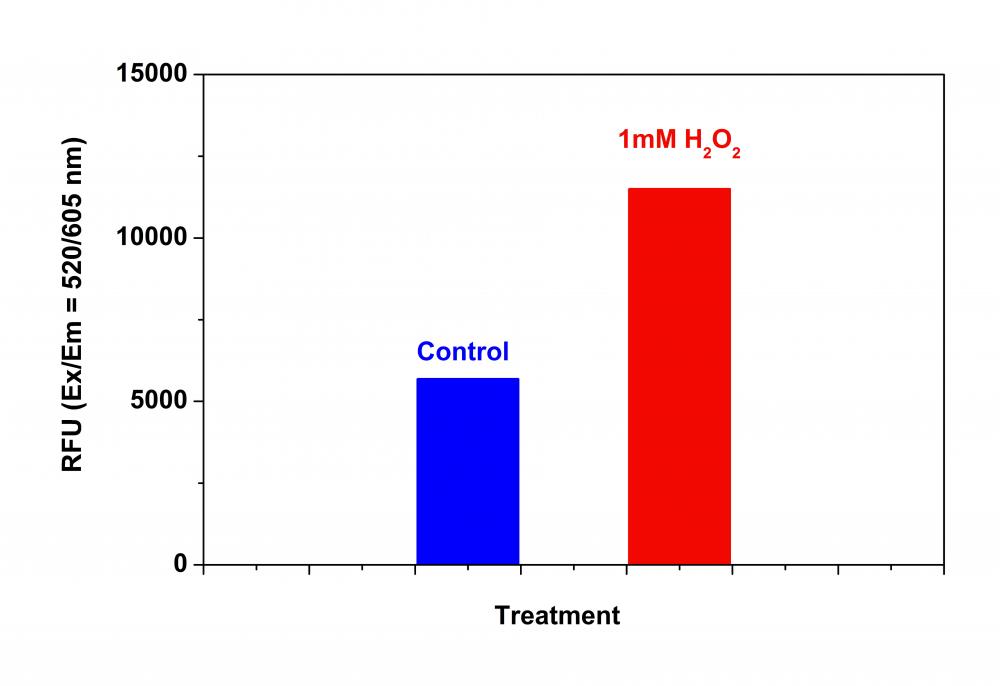活性氧 Cell Meter 荧光法胞内总ROS检测试剂盒 红色荧光
| Ex (nm) | - | Em (nm) | - |
| 分子量 | - | 溶剂 | - |
| 存储条件 | - |
活性氧(ROS)是氧正常代谢的天然副产物,在细胞信号传导中起重要作用。但是,在与氧化应激相关的状态下,ROS水平会急剧增加。 ROS的积累会严重破坏细胞结构。氧化应激在心血管疾病,糖尿病,骨质疏松症,中风,炎性疾病,许多神经退行性疾病和癌症中的作用已得到公认。 ROS测量将有助于确定氧化应激如何调节各种细胞内途径。 Amplite 荧光ROS检测试剂盒使用我们独特的ROS指示剂来定量活细胞中的ROS。 Amplite ROS Red具有细胞渗透性。与ROS反应时会产生红色荧光。该试剂盒是一种优化的“混合和读取”测定形式。 Amplite 荧光ROS测定试剂盒提供了一种灵敏的一步荧光测定法,可在1-2小时的孵育中检测活细胞中的细胞内ROS。该测定可以以方便的96孔或384孔板形式进行,无需分离步骤即可轻松实现自动化。使用荧光酶标仪或荧光显微镜可以轻松读取其信号。它可用于定量ROS活性或筛选ROS抑制剂。百萤生物是AAT Bioquest的中国代理商,为您提供优质的Cell Meter 荧光法胞内总ROS检测试剂盒。
活性氧(ROS)篇:包含总ROS和多种活性氧离子检测试剂大全
适用仪器
| 荧光显微镜 | |
| Ex: | 520 nm |
| Em: | 605 nm |
| 推荐孔板: | 黑色透明底板 |
| 通道: | Texas Red 通道 |
| 荧光酶标仪 | |
| Ex: | 520 nm |
| Em: | 605 nm |
| Cutoff: | 590 nm |
| 推荐孔板: | 黑色透明底板 |
| 读取模式: | 底部读取 |
样品实验方案
简要概述
- 在生长培养基中准备细胞
- 加入Amplite ROS Red工作溶液(对于96孔板为100 µL /孔,对于384孔板为25 µL /孔)
- 在37°C下孵育细胞1小时
- 用测试化合物处理细胞以诱导ROS
- 在Ex / Em = 520/605 nm(截止= 590 nm)或安装Ex / Em = 520/605 nm滤光片的荧光显微镜下检测荧光增加(底部读取模式)
溶液配制
储备溶液配制
1. Amplite ROS Red储备液(500X):将40 µL DMSO(组分C)添加到Amplite ROS Red(组分A)的小瓶中,并充分混合以制成500X Amplite ROS Red储备液。 避光。 注意:20 µL 500X Amplite ROS Red储备液足以用于1个板。 注意:如果将试管紧密密封并避免光照,可以将未使用的部分等分并在<-20°C下保存超过一个月。 避免重复冻融循环。
工作溶液配制
将20 µL 500X Amplite ROS Red储备溶液添加到10 mL的测定缓冲液(组分B)中,并充分混合以制成Amplite ROS Red工作溶液。 注意:此Amplite ROS Red工作溶液在室温下至少可稳定2小时。
实验步骤
1.将100 µL /孔(96孔板)或25 µL /孔(384孔板)的Amplite ROS Red工作溶液添加到细胞板中。
2.将细胞在5%CO2、37°C的培养箱中孵育一小时。
3.在所需的缓冲液(例如PBS或HHBS)中,用20µL 11X测试化合物(96孔板)或10 µL 6X测试化合物(384孔板)处理细胞。 对于对照孔(未处理的细胞),添加相应量的化合物缓冲液。
4.要诱导ROS,请在室温下或在5%CO2、37°C的培养箱中孵育细胞板至少15分钟(对于用1 mM H2O2处理的Hela细胞为30分钟)。
5.在Ex / Em = 520/605 nm(截止= 590 nm)处使用荧光酶标仪(底部读取模式)检测荧光的增加,或在Ex / Em = 520/605 nm滤光片组(Texas Red)下使用荧光显微镜观察细胞)。
参考文献
Anti-proliferation effect of blue light-emitting diodes against antibiotic-resistant Helicobacter pylori
Authors: Ma, Jianwei and Hiratsuka, Takahiro and Etoh, Tsuyoshi and Akada, Junko and Fujishima, Hajime and Shiraishi, Norio and Yamaoka, Yoshio and Inomata, Masafumi
Journal: Journal of Gastroenterology and Hepatology (2017)
Notoginsenoside R1 attenuates high glucose-induced endothelial damage in rat retinal capillary endothelial cells by modulating the intracellular redox state
Authors: Fan, Chunlan and Qiao, Yuan and Tang, Minke
Journal: Drug Design, Development and Therapy (2017): 3343
Good hydration and cell-biological performances of superparamagnetic calcium phosphate cement with concentration-dependent osteogenesis and angiogenesis induced by ferric iron
Authors: Zhang, J and Shi, HS and Liu, JQ and Yu, T and Shen, ZH and Ye, JD
Journal: Journal of Materials Chemistry B (2015): 8782--8795
Topiramate Protects Pericytes from Glucotoxicity: Role for Mitochondrial CA VA in Cerebromicrovascular Disease in Diabetes
Authors: Patrick, Ping and Price, Tulin O and Diogo, Ana L and Sheibani, Nader and Banks, William A and Shah, Gul N
Journal: Journal of endocrinology and diabetes (2015)
Down-regulated peroxisome proliferator-activated receptor γ (PPARγ) in lung epithelial cells promotes a PPARγ agonist-reversible proinflammatory phenotype in chronic obstructive pulmonary disease (COPD)
Authors: Lakshmi, Sowmya P and Reddy, Aravind T and Zhang, Yingze and Sciurba, Frank C and Mallampalli, Rama K and Duncan, Steven R and Reddy, Raju C
Journal: Journal of Biological Chemistry (2014): 6383--6393
Superoxide dismutase as a target of clioquinol-induced neurotoxicity
Authors: Kawamura, Kazuyuki and Kuroda, Yukiko and Sogo, Masako and Fujimoto, Miki and Inui, Toshio and Mitsui, Takao
Journal: Biochemical and biophysical research communications (2014): 181--185
Xanthine oxidase inhibition by febuxostat attenuates experimental atherosclerosis in mice
Authors: Nomura, Johji and Busso, Nathalie and Ives, Annette and Matsui, Chieko and Tsujimoto, Syunsuke and Shirakura, Takashi and Tamura, Mizuho and Kobayashi, Tsunefumi and So, Alex and er and Yamanaka, Yoshihiro
Journal: Scientific reports (2014): 4554
High glucose-induced mitochondrial respiration and reactive oxygen species in mouse cerebral pericytes is reversed by pharmacological inhibition of mitochondrial carbonic anhydrases: implications for cerebral microvascular disease in diabetes
Authors: Shah, Gul N and Morofuji, Yoichi and Banks, William A and Price, Tulin O
Journal: Biochemical and biophysical research communications (2013): 354--358
Automatic flow injection based methodologies for determination of scavenging capacity against biologically relevant reactive species of oxygen and nitrogen
Authors: Magalhaes LM, Lucio M, Segundo MA, Reis S, Lima JL.
Journal: Talanta (2009): 1219
Diabetes and the impairment of reproductive function: possible role of mitochondria and reactive oxygen species
Authors: Amaral S, Oliveira PJ, Ramalho-Santos J.
Journal: Curr Diabetes Rev (2008): 46






